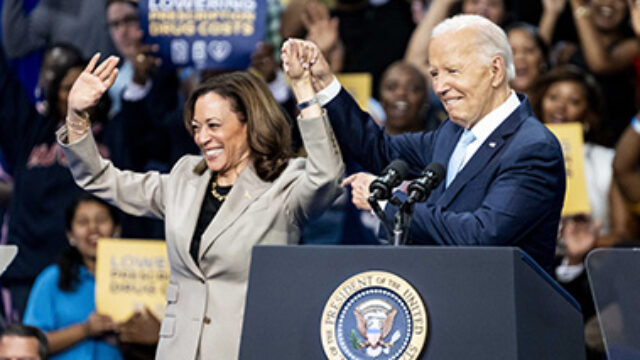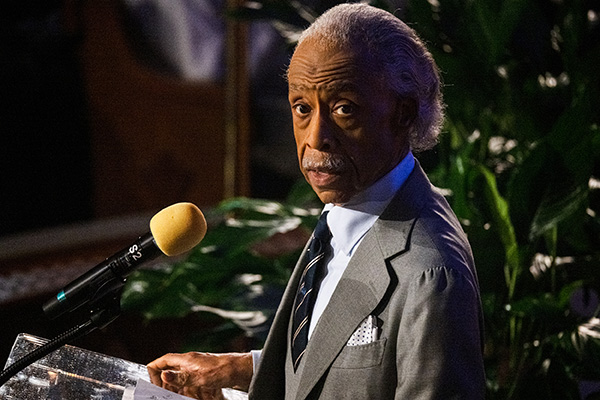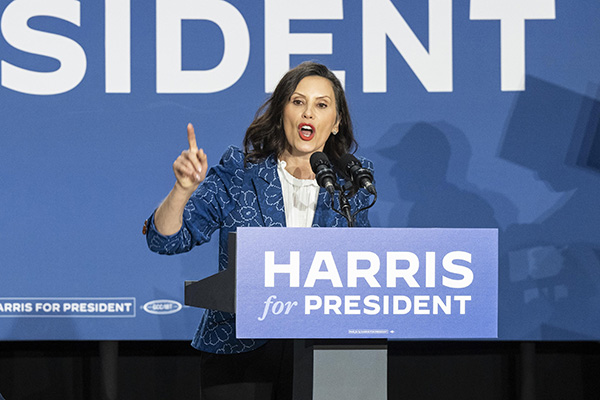Inside the Wildest Battle for the White House

Jonathan Allen and Amie Parnes, Fight: Inside the Wildest Battle for the White House, William Morrow, 2025, $23.14 (hardcover) 352 pp., $14.99 (kindle)
Fight: Inside the Wildest Battle for the White House has a far different tone than the authors’ last campaign book, Shattered, which was about the 2016 election. Shattered was mostly about the collapse of Hillary Clinton’s campaign, and it was sympathetic towards the former First Lady. Donald Trump is a slasher villain, an almost unnoticed presence in the beginning, who gradually takes center stage and slaughters the heroine.
This time, the Democrats suffer from suicide, not murder. The authors can barely contain their scorn towards former President Joe Biden, whose egotism and short-sightedness may have cost the Democrats a winnable race. Barack Obama and Nancy Pelosi are somehow both treacherous and naïve. Kamala Harris comes off far better, a victim of her own loyalty and decency, but clearly not up to the task.

Conservatives may be surprised by the book’s gentle treatment of Donald Trump and his campaign team, who are relatable, understandable, and even likeable. Mr. Trump is engaged, focused, and even charming, with a loyal, professional team that believes in him. It is a major contrast to the sinister and almost demonic Trump we get in Michael Wolff’s All or Nothing: How Trump Recaptured America, which portrays 45-47 as borderline insane and his staff as incompetent grifters. That image may comfort liberal readers eager to believe in their intellectual and moral superiority, but it does nothing to explain how the former real estate mogul has dominated American politics for a decade. Fight does a far better job of explaining Mr. Trump’s rise and the incompetence of the Democrats. They face the same insoluble problem America does: race.
The basic problem for Democrats in 2024 was Joe Biden’s decision to run for re-election. Fight says that his mental and physical decline was increasingly obvious to White House staff. With the President having good days and bad days, it was both cover-up and work-around. His strong performance at the State of the Union in 2024 turned out to be a disaster for the Democrats because it convinced many that the President was fine. Conservatives will remember that most mainstream journalists treated accusations of Mr. Biden’s mental decline as conspiracy theory until his woeful performance at the debate with Donald Trump. Illusions collapsed immediately.
The authors begin the book by describing the way powerful Democrats watched the debate:
In a luxury condo on the Upper East Side of Manhattan, a few blocks from his favorite cigar lounge, Rev. Al Sharpton held his expectations in check. The once-chubby radical activist now had a sleek frame and confirmed status in the political establishment. He had long since traded in tracksuits for three-piece suits, he counted presidents — including Biden — as friends, and he had become a fixture on MSNBC. Though his own presidential ambitions had fallen well short, he was an astute observer of political talent.
Mr. Sharpton’s lucrative career of racial agitation tells us a lot about how the Democratic party works. He arguably paved the way for Kamala Harris’s best moment in her 2020 Democratic primary, when “she painted Biden as a segregationist” and did it “in such a coldblooded fashion that it almost cost her a spot on his ticket the following year.” The authors argue that Miss Harris remained loyal to a fault to Joe Biden after he chose her as vice president, but that Jill Biden never forgave her. Mr. Biden himself may have had lingering resentment.

Al Sharpton (Credit Image: © Laura Brett/ZUMA Press Wire)
Even on the night of the Trump/Biden debate, Democrats were already searching for an alternative. Rep. Hillary Scholten (D-MI) reportedly called for Governor Gretchen Whitmer to be the candidate. However, the Congressional Black Caucus immediately “laid down a marker;” it would not accept anyone but Miss Harris. “I watched the black-white stuff start on Thursday night [the night of the debate],” said one lawmaker who was in a group chat. Among the black Democrats who began quietly discussing alternatives was Jim Clyburn and Rep. Hakeem Jeffries (D-NY), now House Minority Leader. “They would not let their party skip over the first Black woman vice president, not without a fight,” write the authors. (The authors capitalize black but not white.) But at first, they stuck with Mr. Biden.
The authors don’t discuss this, but black support for Joe Biden among the old guard shows a strange reality of Democratic politics: within the party, blacks are conservatives. Bernie Sanders’s socialist movement was almost entirely driven by white voters and met crushing defeat in states with many black voters such as South Carolina. While Bernie Sanders built a movement somewhat outside the party apparatus, blacks have taken it over. Old-fashioned political machines, especially in urban centers and in supermajority black districts, are now terrain for black power brokers rather than launch pads for mass movements. The tendency of blacks to operate as a bloc means they can get their way in intraparty fights, even when it is politically foolish.
For example, Gretchen Whitmer was a favorite of many Democrats, including Barack Obama, who worried about winning white voters. However, her relationship with Kamala Harris was strained because of what had happened in 2020. According to this book, “She felt burned by what she saw as a racially charged behind-the-scenes campaign by Harris’s allies to portray her in a bad light.” She quickly told Miss Harris she was not running for president “under any circumstances,” but also did not offer a quick endorsement when President Biden dropped out. Senator (a representative in 2020) Elissa Slotkin (D-MI) wanted Gretchen Whitmer but said there was no real choice. “If you want to break the Democratic coalition for a generation,” she said, “try to skip over the first African American vice president.”

Gretchen Whitmer speaks at a rally in support of Harris for President, July 29, 2024 (Credit Image: © Lev Radin/ZUMA Press Wire)
President Biden’s hold on the nomination was strengthened because the party machinery was full of his loyalists. Many were black, however, and thus quick to switch to Kamala Harris when the time came. For example, Donna Brazile (a well-known pundit and campaign manager) and convention chair Minyon Moore were “part of a larger group of Black women operatives — calling themselves ‘the colored girls’ ” — who had helped convince Biden to pick a Black woman vice presidential candidate in 2020.”
The authors write that this group, along with Joe Biden and the Clintons, had worked hard to rebuild the party machinery in their own image. Miss Brazile and former state legislator Bakari Sellers both called party delegates throughout the South (many were black or from black constituencies) and found that they were loyal to Joe Biden but would switch to Kamala Harris if she took his place. Miss Harris was also the only candidate who could legally inherit the money that the Biden campaign had already raised.
The striking exception to black support for Kamala Harris was Barack Obama. The authors claim he never had much faith in Joe Biden or Kamala Harris. After the debate, he called Nancy Pelosi to talk about whether the incumbent could still win, and pressed Mr. Biden himself in a tense phone call about whether he still thought he could win. Mr. Obama, the authors claim, did not believe in the party, and built up his own organization during his political campaigns. He favored Gretchen Whitmer or at least an accelerated primary to find a new candidate. Neither he nor Nancy Pelosi believed in Miss Harris, and even the former president was remarkably slow to endorse her after the switch.
None of this is very surprising. Mr. Obama was never a typical black “machine” politician and famously lost to Bobby Rush in an early congressional race. The secret of his appeal was that he was “post-racial,” an illusion that did not die until his second term. His (white) former staffers on the influential Pod Save America podcast were the key figures who set off the flood of criticism that eventually drove Joe Biden out of the race, and it is hard to believe they did not reflect their former boss’s views. Barack Obama could appeal to white voters in swing states and keep an iron grip on blacks — a trick Miss Harris could not manage.
Joe Biden eventually decided not to run because he felt the party was divided, not because he didn’t think he could win. However, his ego is staggering, perhaps larger even than Donald Trump’s. At first, he balked at endorsing Miss Harris because he wanted the headlines to be about him, and he told his vice president that there must be “no daylight, kid” between her campaign and his record. With Mr. Biden already trailing Mr. Trump even before the debate, this crippled her campaign before it started.
At the same time, though the authors (dubiously) claim that Miss Harris did not want to be known for her race and sex, they point out that Mr. Biden’s insistence on “no daylight” meant that those were all she could tout as reasons to vote for her. Though Miss Harris prepared hard for her debate with Donald Trump and arguably defeated him, her interviews were often disastrous. The most damaging moment came in what should have been a softball interview with “The View,” in which she said she could not think of anything she would have done differently from Joe Biden. The Trump campaign made it a campaign ad.
The authors write that Kamala Harris’s “sugar rush” surge after the nomination was real but hit a ceiling. She took a narrow lead in some polls, but it was statistically insignificant and driven by positive media. Aside from the debate, there were no key moments on which to build momentum. JD Vance’s easy defeat of Tim Walz in the vice-presidential debate robbed the Harris campaign of perhaps its last chance to save the campaign.
Racial politics may have been the main reason Tim Walz was picked. The Trump campaign feared that Miss Harris would pick popular Pennsylvania governor Josh Shapiro. However, Governor Shapiro is Jewish and pro-Israel, and the Democrat coalition was already divided over the Israeli response to the Hamas attack. Mr. Shapiro himself also may be preparing to run in 2028, and didn’t seem eager to join the campaign. In contrast, Tim Walz practically begged for the job, only to flub the debate.
However, the authors resist the idea that Miss Harris was doomed from the start. Her surge was real, and the Trump campaign (and its volatile chief) came dangerously close to tearing itself apart, with the candidate showing signs of panic and almost turning on campaign heads Susan Wiles and Chris LaCivita. What doomed Miss Harris, according to the authors, is what they say doomed Mrs. Clinton in Shattered: There was never a compelling reason for her candidacy or a central message. Miss Harris was tied to Joe Biden and never explained why she was running.
In contrast, Mr. Trump’s message was clear. He stressed economic safety (fighting inflation) and physical safety (fighting crime and illegal immigration). The authors heap scorn on his infamous “they’re eating the dogs, they’re eating the cats” claim about Haitians, but they concede it still spoke to a basic worry about safety. Most people thought they knew what Mr. Trump would do back in office.
Tactically, Mr. Trump’s campaign showed a flexibility that Miss Harris’s lacked. With policies such as abolishing taxes on overtime and tips, and stunts such as the McDonald’s photo op, Mr. Trump stayed in the news in ways Miss Harris could not match. The Harris campaign could not seem to operate without a script and seemed afraid to let its candidate speak off-the-cuff. The Trump campaign (notably after some advice from son Barron Trump) put the candidate on podcasts with Theo Von and Adin Ross, appealing to independent male voters. The Trump campaign got some help from Mr. Biden, who called Trump supporters “garbage.” That meant the Trump campaign could turn the stupid joke at Madison Square Garden in which a comedian compared Puerto Rico to floating garbage into another chance for Mr. Trump to tout himself as a friend of workers.

Theo Von and Donald Trump
Exit poll results pose some challenges to white advocates who believe demography is destiny. Mr. Trump’s share of Hispanic voters grew from 42 percent to 46 percent and Asians from 34 percent to 40 percent. He lost women by only eight points, compared to 15 points in 2020. President Trump also increased his rural base, doubling his margin to 30 percent. He won a narrow victory in the suburbs, an improvement over 2020. His gains among blacks (12 to 13 percent) and black men (19 to 21 percent) were marginal.
Yet the real story of the Democrats is the story of the “black vote.” Many Democratic politicians saw the problem emerging, but the Democrat dependence on black politicians crippled them. Mr. Biden initially felt confident about running again because most blacks in the party supported him. Near the end of the book, Mr. Biden thanks Mr. Sharpton for his stalwart support, before calling Nancy Pelosi a traitor. Because the Democrats are so beholden to blacks, there could not be an alternative to Miss Harris once Mr. Biden decided not to run. Indeed, the main reason Miss Harris was even vice president was because black activists (notably the “colored women” party workers) demanded that he pick a black.
However, Mr. Biden gave her unattractive jobs (such as trying to stem immigration). Biden aides even used her unpopularity as a reason to keep their man in the race. And then, remarkably, Joe Biden offered her as the only alternative. After the election, Mr. Biden was arguing that he could have won. The friendships between Mr. Biden, Mr. Obama, and Miss Pelosi were destroyed; Mr. Biden thought he had been betrayed.
Did Kamala Harris ever think she was betrayed? Even I winced at Mr. Biden calling his vice president (who is not a young woman) “Kid” and giving her orders to remain loyal when she had never been disloyal. Maybe the authors are missing something. They concede that Miss Harris is very ambitious and had attacked Joe Biden in the past. It seems too simple to think she sabotaged her own race because she was just too darn loyal. Whatever the truth about her, Mr. Biden, far from seeing himself as the “bridge” and transitional figure he promised to be, thought he was a leader for which others should sacrifice. They didn’t, and he destroyed the party.
The GOP’s future depends mainly on whether President Trump succeeds on immigration and the economy. There is reason for hope on the first and fear for the second. In either case, race will continue to cripple the Democrats. The unwieldly coalition of non-whites with a thin layer of white professionals on top will be hard to unify, especially if blacks continue to insist on a privileged position. The Muslim-Jewish divide over Israel could also prove disastrous, not least if Governor Shapiro runs in 2028. The GOP faces demographic doom in the long run if mass immigration continues. However, the racial divisions within the Democrats threaten a party fracture at worst, and political incompetence at best. The GOP may be the Stupid Party, but that may still be better than being the Black Party.
https://www.unz.com/ghood/inside-the-wildest-battle-for-the-white-house
